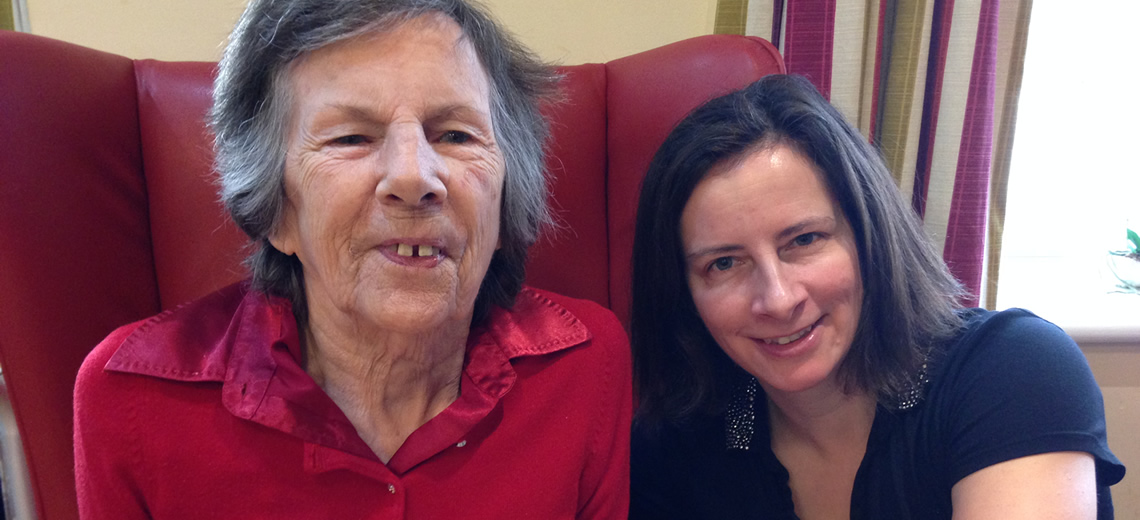SweetTree Discover Our Blog
,Good care makes all the difference

Christina Macdonald is The Alzheimer’s Show’s Online Editor and cares for her mother Hazel, who has vascular dementia. She talks about how her mother was first diagnosed and why good care is so important:
The first signs of mum’s dementia appeared in 2007, when she was caring for my father. He suffered from emphysema and heart damage, and was very weak. His body was shutting down, and he was almost immobile. Yet his mind worked perfectly well and he could see that something was wrong with mum.
He had a fighting spirit, so he woke up one day and decided to go downstairs to make mum a cup of tea. Breathlessly, and with great effort, he managed to hoist himself onto the stair lift and make it to the kitchen. He stopped in front of the worktop where the kettle usually sat. It wasn’t there. He looked around and couldn’t find it. He opened the fridge to get some juice, and found the kettle on the middle shelf of the fridge. He’d been bedbound for the past week, so only mum could have put it there. She denied knowing anything about it and was very aggressive in her denials.
Over time, mum started to forget where she’d put things, what she’d said and where she’d been. She would forget conversations we’d had only ten minutes ago. She would ring me repeatedly and ask the same questions, often forgetting we’d just spoken about ten minutes earlier. Understandably, she became increasingly frustrated.
When my father died, she was clearly devastated, but I could see that we were dealing with more than grief. Mum knew her memory wasn’t good but refused to admit that anything else was wrong. I persuaded her to see the doctor about her memory. The GP did a short memory test and referred her for a CT scan. The diagnosis of vascular dementia was confirmed, and she was prescribed medication to manage the symptoms.
At first, she was able to cope mostly on her own with my help at weekends. Over time, the house became dirty and it was clear that she wasn’t eating properly. I arranged for a care agency to send someone in every day to make sure she was washed and dressed and eating regular meals. At first she resisted the visits, but in time she grew to accept them.
I believe that regular visits from a good carer – be it a professional careworker or a friend – can make a huge difference to a person’s wellbeing. In the beginning, they might only need help with meals and domestic chores, but as the dementia takes hold, their needs will increase. It’s better to have a good carer in place who already knows the person so that if the care plan needs to include personal care, a good relationship has already been established.
Regular company can also make a great difference. I could only visit mum at weekends, as I worked long hours and lived 60 miles away. I noticed she seemed vague and confused when I first arrived, but after we’d spent a few hours together chatting and doing things, she grew far more alert.
When it became apparent that my mother would need 24-hour care, I visited many care homes. Some boasted about their décor. But I soon realised it doesn’t matter how luxurious the furnishings are in a care home. Good care is all about the careworker – which means having the right people (and enough of them) to provide appropriate care for the individual. A good careworker will interact with the person as much as they can, and not just bring them meals. Care at home can be a good solution if it’s practical for the person to stay in their own home, because they will benefit from being in familiar surroundings.
I believe the following are crucial for a person with dementia:
• Social contact – Conversations are not always easy during the mid or late stages of dementia, but simple conversations, friendly greetings, or a touch of the hand all make a difference. In the later stages of dementia, the person may become fearful and insecure. Gentle physical contact, if it’s usually welcomed, can help calm them down.
• Stimulation – It’s not ideal to sit someone in front of a TV on their own for too long. If possible, give the person something to do – if they can assist with straightforward domestic tasks, like folding towels, they will have a sense of purpose. And it will keep their mind active.
• A change of scenery and fresh air – Trips out can take time and effort to plan, but will be worth it to give the person with dementia a break.
• Regular exercise – Exercise can reduce the rate of deterioration and improve blood flow and oxygen to the brain. Walking, jogging, dancing or ball games are perfect choices. If the person isn’t able to walk very well, then you need to get creative. My mother is a huge fan of wheelchair dancing and ball games, as she can still catch a ball.
Good care is about engaging with the person and making them feel safe and valued. I have seen from personal experience the difference it can make. Caring for someone is hard work, and will take a lot of energy and patience. But if you can remind yourself now and then to spend some time chatting to the person, rather than just running around after them, they will benefit from the interaction and will feel more like an equal and less like a patient.
More information
SweetTree is proud sponsor of The Alzheimer’s Show, which offers support and information on all aspects of coping with dementia.
